Candy v kale: healthy food comes to US corner stores in fight against ‘retail redlining’

A movement of entrepreneurs in US cities is bringing healthy food to neighborhoods hurt when policies create food deserts
Last modified on Fri 27 Aug 2021 09.58 EDT
When Samantha Pounder and Hannah Choi imagine the shelves of a corner store, they see fresh aloe and kale instead of the usual sugary, shrink-wrapped confections and salty snacks.
It’s a vision that will soon become a reality when the pair open Muki’s Market in Washington DC, one of the newest additions to a growing movement to supply big city food deserts with healthy corner stores.
“The reality is there’s a need for more fresh food options,” says Pounder, food access director of Arcadia, a local non-profit. “When there are no grocery stores within walking distance or even a reasonable driving distance that becomes a problem.”
In Boston, Philadelphia, Indianapolis, San Jose, California, and Newark, New Jersey, a movement of entrepreneurs are opening similar shops to combat a practice known as “retail redlining”, when deliberate policies implemented over time create food deserts in predominantly Black and low-income neighborhoods.
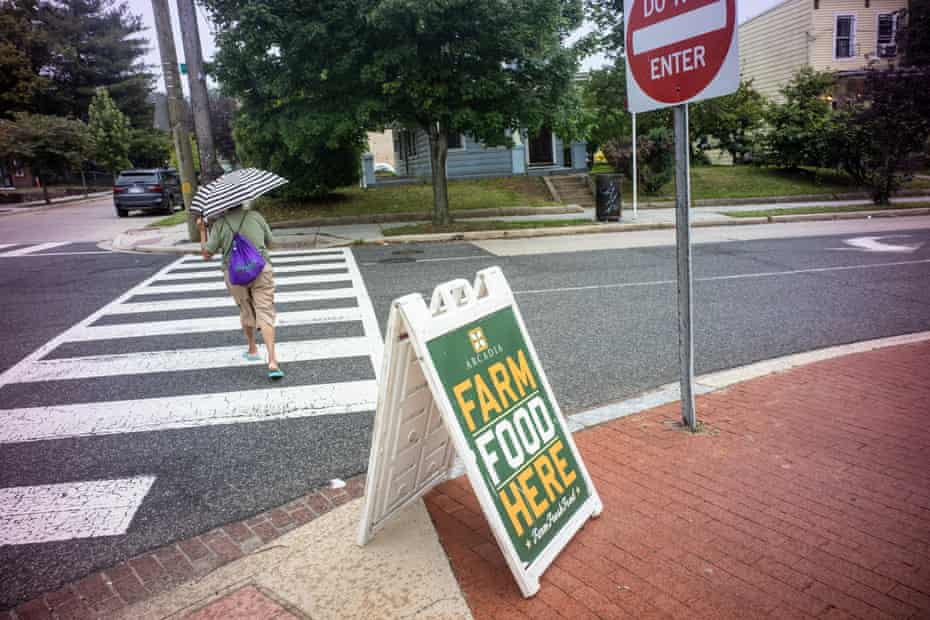
Brian Lang, director of the National Campaign for Healthy Food Access at the Food Trust, said: “By failing to aggressively combat the circumstances that led to the shortage of retail, food companies and public sector developing agencies have, in essence, redlined Philadelphia’s low income communities.”
It’s a similar situation in other US cities. The US Department of Agriculture provides $3m to $5m annually to a Healthy Food Financing Program, but Lang said it is not enough. He thinks more money is needed to support programs such as the Food Trust’s Healthy Corner Store Initiative, which gives technical and financial support to healthy corner stores.
A model of this movement can be found at the corner of 62nd and Market St in West Philadelphia, where Arnett Woodall, who goes by “Unc”, has been trying to uplift his neighborhood through food for more than a decade.
Woodall says there are plenty of “fringe” food stores and delis in the area, but warns that items such as hoagies are deadly. “You can get a hoagie on any corner in West Philly, but the bread turns into sugar and causes diabetes, the cheese gives you high cholesterol and the iceberg lettuce is basically water,” says Woodall, adding that the processed meat is a danger too. “You have to educate people about what healthy food is and what it looks like.”
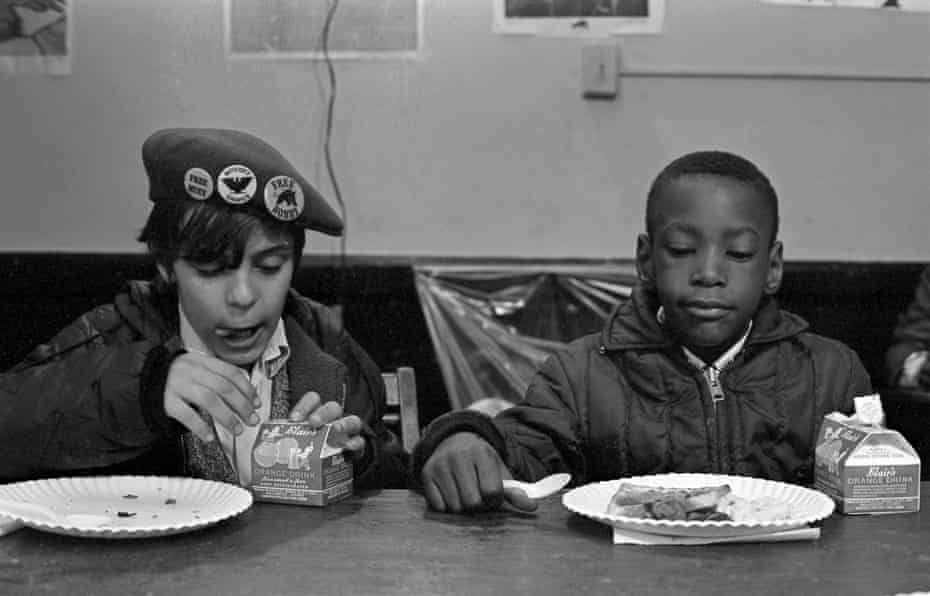
Woodall’s free food program is inspired by the Black Panther’s Free Breakfast for School Children Program in the late 1960s and the early 1970s, and he uses his store to teach business skills to the youth he employs. West Phillie Produce was the only grocer open in the area during the racial uprisings that took over the streets of Philadelphia in June 2020. Customers walked more than two miles to purchase food from the small corner store that has become a beacon of hope for the neighborhood.
“People come in here and don’t know how to engage the community. Growing up, our corner store owners were Black and they employed people from the community,” Woodall says. “Now they are from outside the community and that matters.”
‘Strengthen communities through food’
Many other cities are following Woodall’s playbook, including DC, where Pounder and Choi are setting up shop.
Washington DC recently launched a $3m initiative to bring “new food and retailers” to the wards 4, 7 and 8 in the city. Pounder and Choi received a $100,000 grant from the Office of the Deputy Mayor for Planning and Economic Development (DMPED) as part of the Neighborhood Prosperity Fund. The money is being used to complete construction on a building owned by Choi’s mother that was once a Black owned seafood market in the Fort Dupont neighborhood.
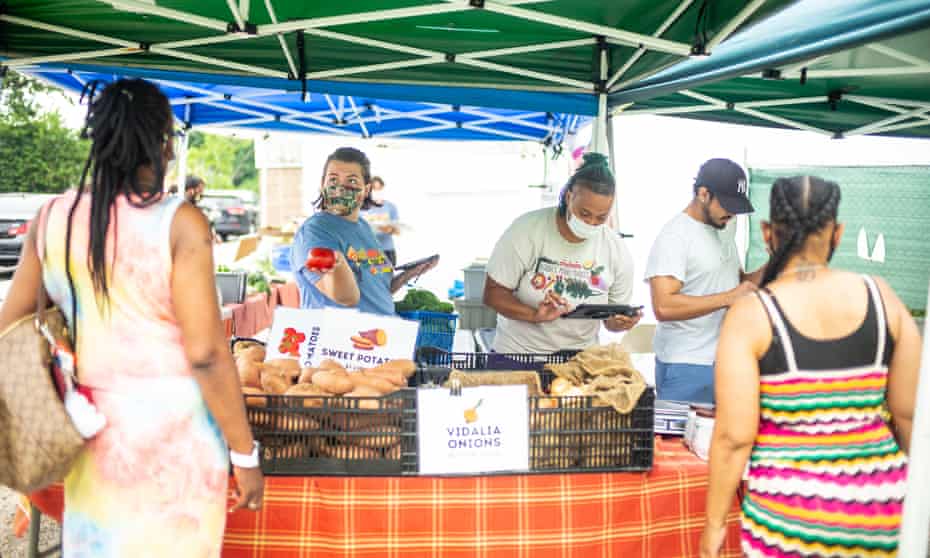
As of now, the space is being used as a mobile market that hundreds of people rely on each week. The operator of the market, Arcadia Center for Sustainable Food & Agriculture, said its service is a temporary, unsustainable solution for the community.
“We want to work ourselves out of a job,” said Pamela Hess, Arcadia’s executive director. “We are like a bridge, or a Band-Aid, and we want there to be a permanent solution.”
Arcadia partnered with another location in the city until it received a grant to pay for a weekly market. Then, Arcadia gave them technical help, turned over all their sales data, and “moved on”. Hess is repeating the process with Pounder and hopes to do so again with another mobile market in ward 8, DC’s poorest ward and Arcadia’s highest generating revenue site.
“There is a skill set to being a green-grocer that a small store, that wasn’t setup to do this or isn’t interested in doing this, doesn’t have,” said Hess.
Many small businesses like corner stores don’t stock produce because it’s highly perishable and has a small profit margin with a lot of waste. But Woodall, who was named activist of the year in 2019 by SustainPHL, says that’s just an excuse. He’s partnered with Whole Foods to distribute food through what he calls “the community table” that sits outside of his store.
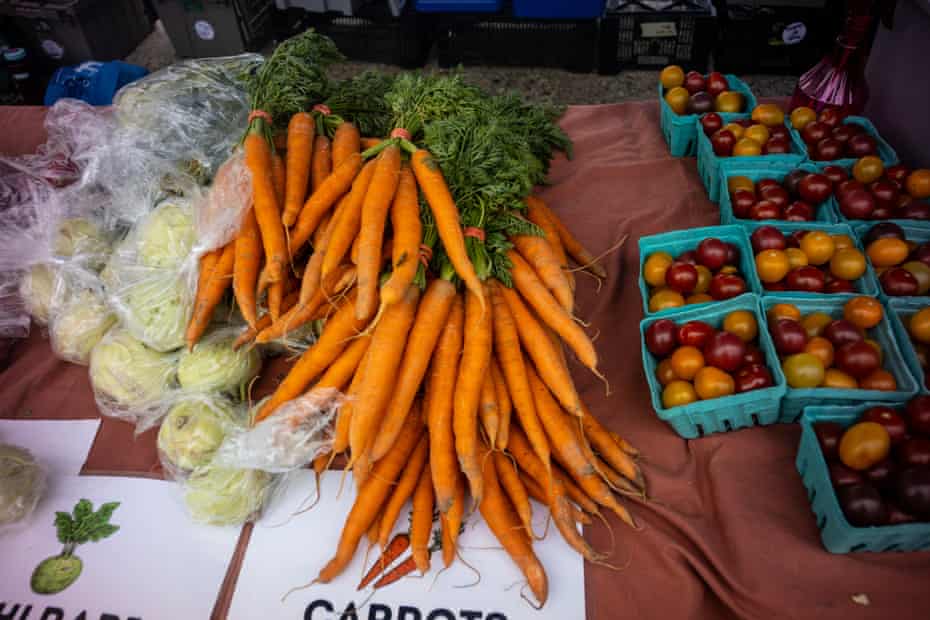
“I repurpose the food I don’t use by making salads, and smoothies and I give it away,” Woodall says. “We have given away tons of food in seven years. Before the food goes bad, I make sure it goes to my community.”
Pounder’s vision for Muki’s Market is also community driven. As a part of the funding from the city of DC, Pounder and Choi must hire staff from the neighborhood to actively increase revenue in ward 7. The people of Fort Dupont are key to the success of Muki’s Market and Pounder wants to take it a step further by “activating the block”. She is a regular at the barbershop a few doors down and has established relationships with many of the residents who shop at the mobile market.
“I’ve taken the time to get to know people because I’m not from here and that’s just good business,” she said as a woman stops to give her a hug. “We intend to have an events calendar, pumpkins for Halloween and someone to teach gardening to the kids.”
To offset costs, Pounder plans to offer readymade items such as coffee, breakfast sandwiches, and Korean food – a homage to Choi’s background. But the Muki’s Market demographic is unique. Fort Dupont is home to a large Caribbean community, which presents an exciting challenge for the entrepreneurs.
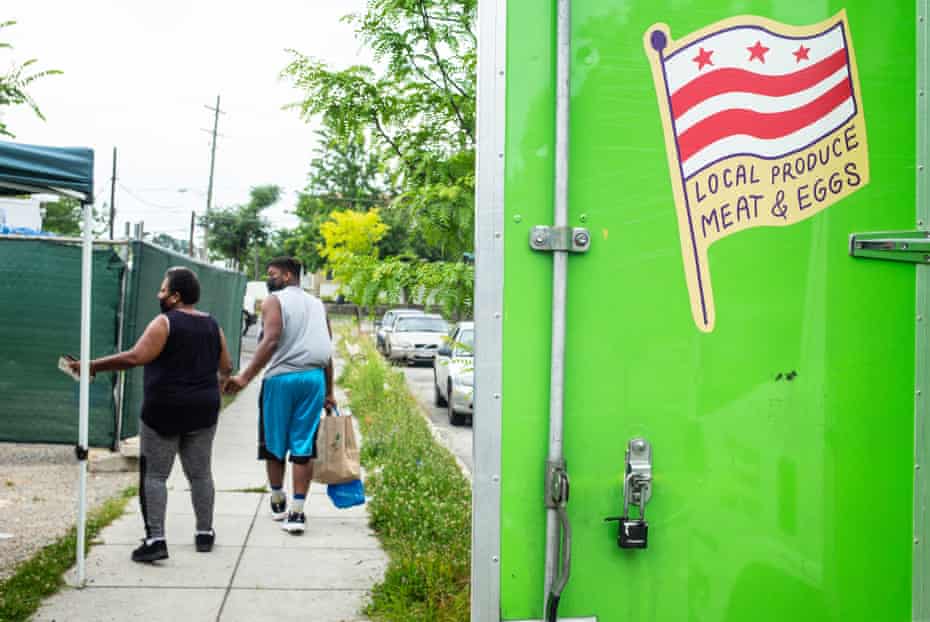
“We’ve received requests for turmeric root, aloe and items included in the Ital diet,” she says. “I hate to call it new age food, because it’s food that is so connected to our roots as Black people.”
The Ital diet, is a vegan diet followed by Rastafarians consisting of kale, pumpkin, callaloo, tofu, fruits, beans, legumes and dishes from African and Indian cuisine. Vegan and vegetarian diets have become more popular within the Black community in recent years and for many adopting African foodways has been a form of food justice.
These community corner stores are only a small piece of what’s needed to give more people access to healthy food.
Ellen Vollinger, legal director and director of advocacy on behalf of the Supplemental Nutrition Assistance Program (Snap/food stamps) at the Food Research and Action Center, says people have a tendency to romanticize the smaller interventions.
Farmer’s markets and healthy corner stores are a help, but Vollinger said: “You have to multiply it by a lot to make a dent.”
She insists the Snap program has the most impact. Earlier this month the Biden administration announced new rules for the largest permanent increase to benefits in the program’s history, and which will come into effect in October. The average monthly benefits, which were $121 per person before the pandemic, will rise by $36 permanently, according to the New York Times.
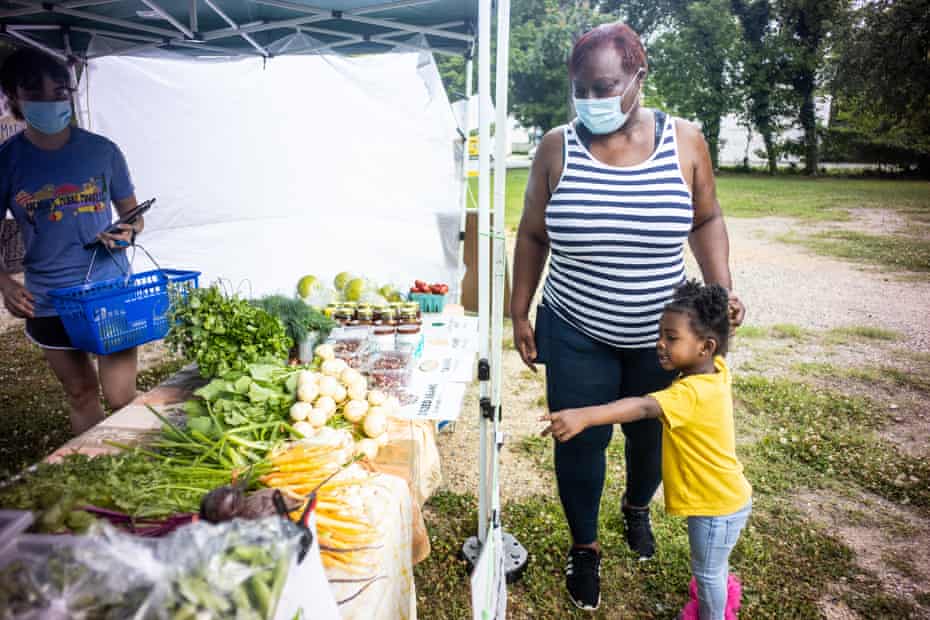
“While there is an increase in Snap at farmer’s markets, that’s never going to be a sufficient replacement for all people’s grocery needs,” Vollinger said. “Most benefits that are spent and redeemed tend to be in the larger grocery settings because that’s how most Americans shop and they have the broadest selection.”
The biggest barrier to healthy food is price according to a June report released by the US Food and Nutrition Service, supporting Vollinger’s argument. Muki’s Market is not a farmer’s market, so they are not eligible to provide the “Double Bucks” program that allows shoppers to double the amount of their EBT (electronic benefit transfer) for most items. However, Pounder says they will accept Snap and host the mobile market as a pop up.
Though the farmer’s market and healthy corner stores may not solve the issue of healthy food access, Woodall says Black-led green grocers are a necessity. He wants to see fruit and vegetables on every corner.
“The concept is to strengthen and fortify communities through food,” he says. “I want to show individuals you can build Black Wall Street from the ground up.”
